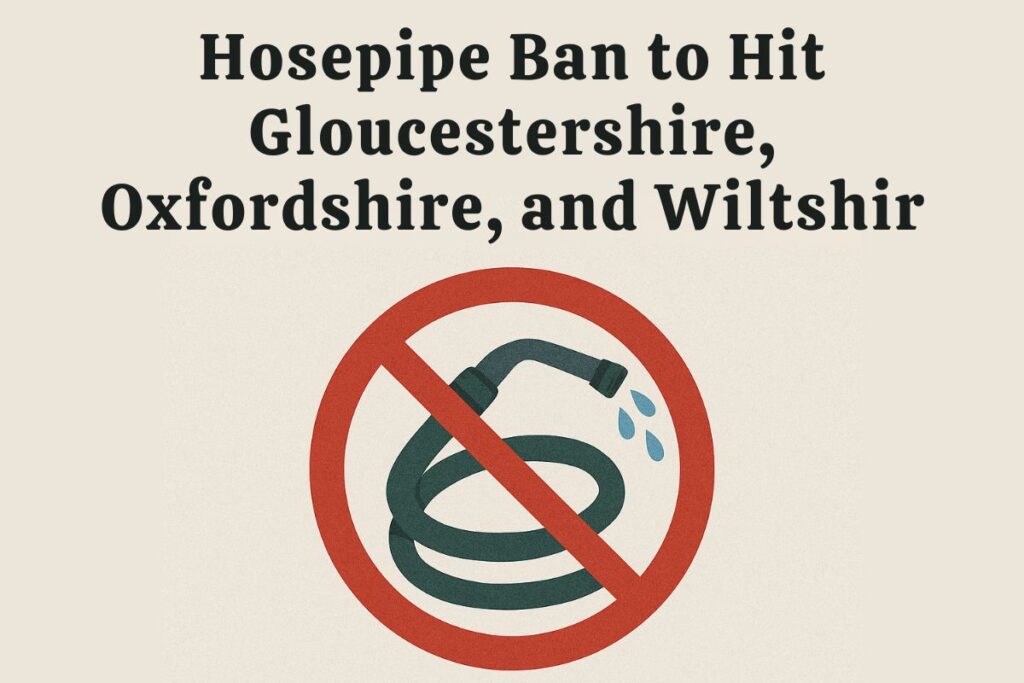
Thames Water has announced a temporary hosepipe ban that will affect 1.1 million customers starting 22 July, citing low rainfall and soaring water demand during hot weather. The restriction will apply across parts of Gloucestershire, Oxfordshire, Berkshire, and Wiltshire, covering postcodes beginning with OX, GL, SN, RG4, RG8, and RG9.
The ban prohibits the use of hosepipes for everyday activities such as:
- Watering gardens and lawns
- Washing cars or windows
- Filling paddling pools or ornamental ponds
Violating the hosepipe ban can result in a fine of up to £1,000.
Why Is the Ban Being Imposed?
Thames Water blamed the decision on unusually dry weather and extreme temperatures, which have c reated a significant strain on water supplies. The Environment Agency has already declared a state of prolonged dry weather in large parts of Oxfordshire, Berkshire, and Surrey, with some areas receiving below-average rainfall for months.
The company reported that during hot spells where temperatures exceed 25°C, household water consumption spikes by as much as 30%, intensifying pressure on an already stretched supply system.
Nevil Muncaster, Thames Water’s Strategic Water Resources Director, stated:
“This has been a challenging spring and summer, with big spikes in customer demand and very little rainfall to replenish supplies. We don’t anticipate the situation will improve any time soon. We must take action now.”
Who’s Affected and Who’s Exempt?
The hosepipe ban affects residential customers, but exemptions apply to businesses that require hosepipes for operational reasons. This includes:
- Garden centres
- Nurseries
- Car wash services
Still, Thames Water is urging everyone across the region, even outside the restricted zones, to be mindful of water use. Suggested water-saving tips include:
- Turning off taps while brushing teeth
- Taking shorter showers
- Avoiding watering lawns
- Using watering cans instead of hosepipes
Widespread Restrictions Across the UK
This is not an isolated issue. Yorkshire Water and South East Water have already implemented hosepipe bans, impacting over 6.4 million people combined. These measures reflect a growing concern over water shortages in southern and central England, as climate conditions become more unpredictable.
GMB Union Slams Thames Water Over Leaks and Mismanagement
The announcement sparked backlash, especially from the GMB Union, which criticized Thames Water’s water loss through leaks, calling the hosepipe ban “disgraceful.”
According to GMB, Thames Water leaked 200 billion litres of water in the past year, which equates to 570 million litres every day—the worst leakage rate in the UK.
Gary Carter, national officer for GMB, said:
“Our members are working with crumbling i nfrastructure and virtually no investment. For Thames Water to impose a ban while customers face rising bills is nothing short of shameful.”
Thames Water Responds: Leak Reduction Efforts in Progress
Thames Water defended its position, claiming that leakage is now at its lowest recorded level. A company spokesperson highlighted ongoing improvements, saying:
“We’re fixing around 650 leaks per week. Our engineers are focused on the most critical leaks to protect local water supplies.”
The company also said it’s making use of smart meters, acoustic loggers, and advanced leak detection technologies to monitor and fix water loss more efficiently.
The Bigger Picture: Climate Challenges and Water Security
The Thames Valley region is facing a perfect storm of dry weather, aging infrastructure, and increasing water consumption. While hosepipe bans offer short-term relief, they also point to larger structural issues—particularly the need for long-term investment in water infrastructure, increased leakage prevention, and smarter water usage by both providers and consumers.
The situation also underscores the impact of climate change on the UK’s water security, highlighting the urgency for sustainable water management practices and more resilient infrastructure.
Conclusion: A Call for Collective Responsibility
As the 22 July hosepipe ban approaches, Thames Water is urging both individuals and businesses to take water conservation seriously. While the company works to address internal inefficiencies, public cooperation is crucial to ensure there is enough water to meet essential needs during the prolonged dry spell.
Customers in affected regions should stay informed, comply with the restrictions, and take proactive steps to reduce daily water usage. As the UK faces more frequent extreme weather events, the r esponsibility to manage water wisely must be shared by all.






